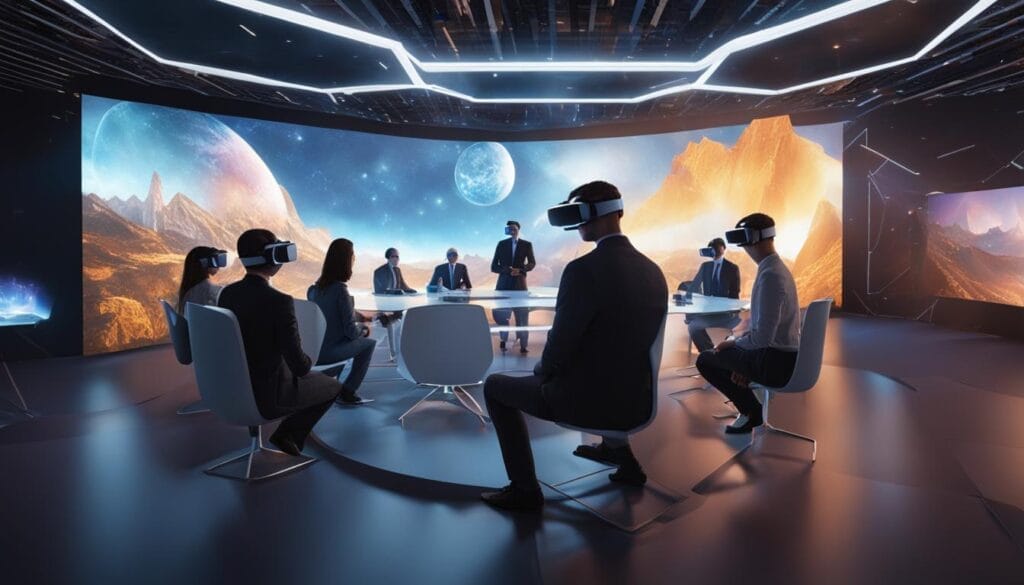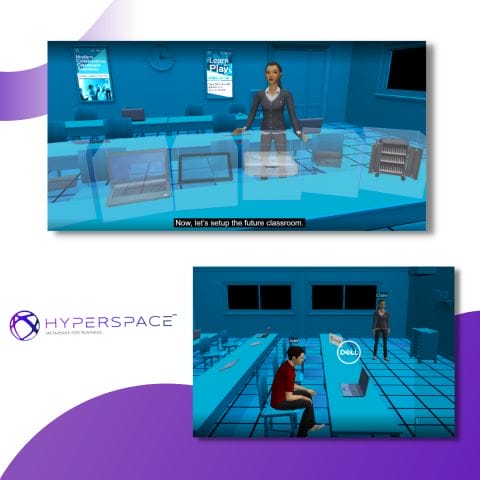The concept of the metaverse has been the subject of much discussion and debate in recent years. It refers to a virtual world created through the use of virtual reality (VR) and augmented reality (AR) headsets. This next evolution of the internet has the potential to transform various aspects of our lives, including the business landscape in the United States.
Companies are already exploring how the metaverse can impact their operations, customer engagement, and overall business models. From enhancing customer experiences to revolutionizing product development, the metaverse offers new opportunities and challenges for businesses of all sizes and industries.
Key Takeaways:
- The metaverse is a virtual world created through VR and AR technology.
- Businesses can leverage the metaverse to enhance customer engagement and improve employee productivity.
- The metaverse offers immersive and interactive experiences that can revolutionize various industries.
- Businesses need to adapt and embrace the unique characteristics of the metaverse to stay competitive in the digital economy.
- The metaverse has the potential to transform customer behaviors, marketing strategies, and business models.
What is the Metaverse?
The metaverse is a revolutionary concept that aims to create a universal and immersive virtual experience. It brings together the digital and physical worlds, enabling users to engage in social and economic interactions like never before. Unlike traditional online platforms, the metaverse is not limited to a single platform or company. Various tech giants such as Meta, Microsoft, Roblox, and Epic Games are working on their own versions of the metaverse, each with its own unique features and offerings.
The metaverse can be defined as a network of interconnected 3D virtual worlds that prioritize user immersion and interaction. It leverages virtual reality (VR) and augmented reality (AR) technologies to create a more natural and vivid virtual environment. Users can explore these virtual worlds, interact with other users, and engage with the environment in meaningful ways. The metaverse is not just a passive experience; it is a dynamic and evolving digital ecosystem that continues to exist and develop even when users are not actively engaged.
“The metaverse represents a convergence of technology, innovation, and human connection. It has the potential to transform industries and redefine the way businesses operate.”
The metaverse is not just limited to the realm of gaming or entertainment. Its applications span across various industries, including business, education, healthcare, and more. Companies are already exploring how they can leverage the metaverse to enhance customer engagement, streamline operations, boost employee productivity, and drive innovation. The metaverse is more than just a buzzword; it is a transformative concept that has the power to shape our future digital landscape.
Key Features of the Metaverse

The metaverse offers several key features that set it apart from traditional online platforms. These features contribute to the immersive and interactive nature of the metaverse, making it a unique and transformative digital space.
Immersive Experiences
One of the key features of the metaverse is its ability to provide immersive experiences. Through the use of virtual reality (VR) and augmented reality (AR) technology, users can feel present in the virtual world, blurring the lines between the physical and digital realms. This creates a more engaging and realistic environment, enabling users to interact with objects, people, and the virtual surroundings in a more natural and vivid way. Immersive experiences in the metaverse have the potential to revolutionize various industries, such as gaming, entertainment, education, and even healthcare.
Interactivity
The metaverse also offers a high level of interactivity, allowing users to engage with each other and the virtual environment. Users can collaborate, communicate, and socialize with others in real-time, fostering connections and relationships. The interactive nature of the metaverse promotes collaboration and creativity, opening up new possibilities for teamwork, remote work, and virtual events. Businesses can leverage this feature to enhance employee productivity, streamline operations, and provide innovative customer experiences.
Persistence
Another key feature of the metaverse is its persistence, meaning that it continues to exist and evolve even when users are not actively engaged. This allows for lasting impacts and experiences within the virtual world. The metaverse is a dynamic and ever-changing space, where businesses can create and shape their presence over time. This persistence provides opportunities for long-term customer engagement, continuous learning and development, and ongoing innovation.
The key features of the metaverse, including immersive experiences, interactivity, and persistence, contribute to its potential to transform various industries and redefine the way businesses operate. By leveraging these features, businesses can unlock new opportunities for growth, innovation, and customer engagement in the evolving digital landscape.
The Impact of the Metaverse on Business

The metaverse has the potential to bring about significant transformations in the business world. As companies explore the possibilities of this emerging virtual realm, they discover new opportunities to enhance customer engagement, streamline operations, and drive innovation. However, businesses also face challenges in adapting to the metaverse and understanding its unique characteristics. Let’s take a closer look at the impact of the metaverse on business.
Metaverse Transformations:
The metaverse offers businesses the chance to transform the way they interact with customers and stakeholders. By leveraging the immersive and interactive nature of the metaverse, companies can create engaging virtual experiences that go beyond traditional digital platforms. From virtual showrooms and immersive product demonstrations to interactive customer support and personalized marketing campaigns, the metaverse opens up a world of possibilities for enhancing customer engagement.
Metaverse Opportunities for Businesses:
In addition to customer engagement, the metaverse presents numerous opportunities for businesses to improve internal operations and drive innovation. Virtual workspaces and holographic meetings can enhance employee productivity and collaboration, especially in hybrid work environments. Virtual training and skills assessments can revolutionize the hiring process, making it more efficient and cost-effective. Furthermore, the metaverse offers a platform for virtual prototyping and digital testing, enabling companies to innovate and iterate on new products and services.
“The metaverse opens up a world of opportunities for businesses to engage with customers, streamline operations, and drive innovation.”
Metaverse Challenges for Businesses:
While the metaverse holds immense potential, businesses also face challenges in adapting to this new digital landscape. Understanding the unique characteristics of virtual environments and rethinking traditional business models are key challenges that companies must navigate. Additionally, ensuring data privacy and security in the metaverse is crucial to maintaining customer trust. As businesses embrace the metaverse, they must address these challenges to fully capitalize on the transformative power it offers.
| Metaverse Impact on Business | Opportunities | Challenges |
|---|---|---|
| Enhanced customer engagement | Improved employee productivity and collaboration | Understanding the unique characteristics of virtual environments |
| Streamlined operations | Revolutionized hiring processes | Rethinking traditional business models |
| Drive innovation and product development | Virtual prototyping and digital testing | Data privacy and security in the metaverse |
As the metaverse continues to evolve, businesses that proactively explore its potential will be well-positioned for success in the digital economy. By embracing the metaverse and leveraging its capabilities, companies can drive growth, foster innovation, and stay ahead of the competition. The metaverse represents a new frontier in business, and those who understand its impact and adapt accordingly will unlock exciting opportunities in the virtual world.
The Metaverse and Customer Engagement
The metaverse presents an exciting opportunity for businesses to enhance customer engagement and create immersive experiences. With the use of VR and AR technology, virtual worlds can be utilized to showcase products and services in a more interactive and engaging manner.
Customers can explore virtual environments, interact with virtual representations of products, and even test out features before making a purchasing decision. This immersive experience can help businesses build stronger connections with their customers and provide a memorable brand experience.
In addition to product showcasing, the metaverse also opens up possibilities for virtual customer support. Companies can deploy virtual assistants or representatives who can assist customers in real-time, providing personalized recommendations and guidance. This level of support can enhance customer satisfaction and create a more convenient and efficient customer service experience.
| Metaverse and Customer Engagement | Benefits |
|---|---|
| Immersive Experiences | Customers can explore virtual environments and interact with products in a more interactive and engaging manner. |
| Virtual Customer Support | Virtual assistants or representatives can provide real-time assistance and personalized recommendations. |
| Metaverse Marketing | Businesses can leverage the interactivity and immersion of the metaverse to connect with customers on a deeper level. |
Furthermore, the metaverse offers innovative opportunities for marketing. By utilizing the interactivity and immersion of the virtual environment, businesses can create unique and memorable marketing campaigns. These campaigns can leverage gamification, interactive storytelling, and virtual events to engage customers in a way that traditional marketing channels cannot.
In conclusion, the metaverse has the potential to revolutionize customer engagement for businesses. By embracing immersive experiences, virtual customer support, and metaverse marketing strategies, companies can create stronger connections with their customers and provide a more personalized and interactive brand experience. As the metaverse continues to develop, businesses that adapt and leverage its capabilities will have a competitive edge in the evolving digital landscape.
Enhancing Employee Productivity in the Metaverse
The metaverse presents exciting opportunities for businesses to enhance employee productivity through virtual training, immersive workspaces, and holographic meetings. By harnessing the power of VR and AR technology, companies can revolutionize the way their employees learn, collaborate, and communicate.
Innovative Virtual Training
Virtual training in the metaverse offers a unique and immersive learning experience for employees. Through virtual simulations and interactive scenarios, individuals can acquire new skills and knowledge efficiently. Whether it’s safety training for hazardous environments or specialized skills development, the metaverse provides a cost-effective and scalable solution. Employees can engage in realistic training exercises, making mistakes and learning from them in a risk-free environment.
Immersive Workspaces
Immersive workspaces in the metaverse blur the line between the physical and digital realms, offering employees a customizable and engaging environment. These virtual offices can be tailored to suit individual preferences and foster creativity and productivity. From personalized layouts to virtual whiteboards for collaborative brainstorming, the metaverse enables seamless hybrid work and efficient remote collaboration. This flexibility promotes a healthy work-life balance and empowers employees to work in a way that best suits their needs.
Holographic Meetings
Holographic meetings in the metaverse take remote collaboration to a whole new level. By using holographic projections, employees can have lifelike interactions, as if they were physically present in the same room. This immersive experience fosters better communication, enhances teamwork, and enables more effective decision-making. Whether it’s a brainstorming session or a project update, holographic meetings in the metaverse make remote work feel more connected and engaging.
The metaverse empowers businesses to unlock the full potential of their employees by leveraging virtual training, immersive workspaces, and holographic meetings. As companies embrace this digital frontier, they can enhance employee productivity, foster innovation, and create a more engaging work environment. By embracing the metaverse, organizations can stay ahead in an ever-evolving digital landscape and thrive in the future of work.
Revolutionizing Hiring Processes with the Metaverse
In the ever-evolving digital landscape, the metaverse is set to revolutionize hiring processes by introducing virtual interviews and immersive skills assessments. Virtual interviews offer a more efficient and inclusive experience for both employers and candidates, eliminating geographic barriers and saving time. With the metaverse, employers can reach a wider pool of talent and conduct interviews in a more immersive and engaging manner.
Immersive skills assessments in the metaverse provide a unique opportunity to evaluate candidates’ capabilities and performance in a virtual environment. Employers can create interactive scenarios that test candidates’ problem-solving skills, adaptability, and teamwork abilities. These immersive assessments offer a more accurate representation of candidates’ potential and suitability for specific roles.
Furthermore, the metaverse opens up new possibilities for virtual recruitment events and platforms. Companies can host virtual career fairs, allowing candidates to explore job opportunities and engage with employers in a dynamic and immersive setting. Virtual recruitment platforms can also facilitate networking and talent acquisition, connecting employers with top talent from around the world.
| Benefits of Metaverse in Hiring Processes |
|---|
| Efficiency: Virtual interviews save time by eliminating the need for travel and logistics. |
| Inclusivity: Virtual interviews remove geographic barriers and improve accessibility for candidates. |
| Immersive Assessments: The metaverse allows for interactive scenarios to assess candidates’ skills and capabilities. |
| Wider Talent Pool: Employers can reach a global talent pool and attract candidates from diverse backgrounds. |
| Networking Opportunities: Virtual recruitment events and platforms enable employers to connect with top talent worldwide. |
The metaverse is reshaping the hiring landscape, offering innovative ways to evaluate candidates and attract top talent. As businesses embrace this digital transformation, virtual interviews, immersive skills assessments, and virtual recruitment events will become integral to hiring processes. By leveraging the power of the metaverse, companies can make more informed hiring decisions, improve candidate experiences, and build diverse and talented teams.
Innovating Product Development in the Metaverse
The metaverse offers businesses a unique opportunity to innovate and revolutionize their product development processes. Through virtual prototyping and digital testing, companies can accelerate innovation, reduce costs, and bring products to market more efficiently. This section explores how the metaverse is reshaping product development and what it means for businesses.
Virtual Prototyping: Redefining the Design Process
In the metaverse, virtual prototyping enables companies to create digital replicas of their products and test them in a virtual environment. This allows for rapid iteration and refinement without the need for physical prototypes, saving both time and resources. Companies can visualize and manipulate their designs in 3D, gaining insights into product functionality, aesthetics, and user experience. With virtual prototyping, businesses can identify and address design flaws early in the development cycle, resulting in higher-quality products and improved customer satisfaction.
Digital Testing: Streamlining the Validation Process
The metaverse also offers a platform for comprehensive digital testing of products. Companies can simulate real-world scenarios and evaluate performance, durability, and safety in virtual environments. This eliminates the need for extensive physical testing, reducing costs and accelerating time to market. Digital testing enables businesses to identify and resolve potential issues before production, ensuring that products meet or exceed customer expectations. The metaverse provides a controlled and scalable testing environment, allowing for precise data collection and analysis to drive data-driven decision-making.
Metaverse-Driven Innovation: Unlocking New Possibilities
By leveraging the capabilities of the metaverse, businesses can unlock new possibilities for innovation. With access to virtual environments, companies can experiment with novel ideas, explore unconventional designs, and push the boundaries of what is possible. The metaverse enables cross-disciplinary collaboration, bringing together experts from different fields to co-create and enhance products. This fosters a culture of innovation and fosters the development of disruptive solutions. Through metaverse-driven innovation, businesses can stay ahead of the competition and deliver products that resonate with customers in a rapidly evolving digital landscape.
| Benefits of Metaverse-Driven Product Development | Challenges of Metaverse-Driven Product Development |
|---|---|
|
|
In the metaverse, businesses have the opportunity to transform their product development processes through virtual prototyping, digital testing, and metaverse-driven innovation. By embracing these advancements, companies can accelerate innovation, reduce costs, and deliver high-quality products that meet customer expectations in the rapidly evolving digital landscape. However, challenges such as integrating metaverse tools with existing processes and addressing privacy concerns must be carefully navigated to fully leverage the potential of the metaverse in product development.
Industries Most Affected by the Metaverse
The metaverse is poised to have a significant impact on various industries, but three sectors stand out as particularly influenced: the gaming industry, the fashion industry, and the retail sector.
Gaming Industry:
The metaverse and the gaming industry are closely intertwined, with the gaming industry being one of the early adopters of this immersive virtual world. Gaming companies are creating rich and interactive experiences within the metaverse, enabling players to engage and connect with each other across platforms. Collaborations between gaming and other industries, such as music and film, are also becoming more prevalent, further expanding the metaverse’s reach. As the metaverse continues to evolve, the gaming industry is likely to play a significant role in shaping its development.
Fashion Industry:
The fashion industry has recognized the potential of the metaverse as a platform for virtual fashion and digital experiences. Brands like Nike and Gucci have already begun experimenting with virtual-only products and avatar customization within the metaverse. This new frontier allows fashion brands to explore innovative ways of engaging with consumers, creating virtual showrooms, and offering unique digital experiences. The metaverse opens up exciting opportunities for the fashion industry to redefine the concept of fashion and consumer engagement in a virtual space.
Retail Sector:
Retailers are also exploring the metaverse as a means of providing virtual shopping experiences and revolutionizing the customer journey. Virtual storefronts and digital marketplaces within the metaverse offer a dynamic and immersive way for consumers to interact with products and make purchases. Retailers can leverage the metaverse to create personalized and interactive brand experiences, enhancing customer engagement and building stronger connections. As the metaverse continues to evolve, the retail sector will likely find new and innovative ways to leverage its potential.
| Industry | Metaverse Impact |
|---|---|
| Gaming | Creating immersive gaming experiences and cross-industry collaborations. |
| Fashion | Exploring virtual fashion and digital-only products within the metaverse. |
| Retail | Providing virtual shopping experiences and innovative customer interactions. |
As the metaverse continues to develop and mature, other industries may also find unique ways to incorporate the metaverse into their operations. The potential for virtual experiences, enhanced customer engagement, and innovative business models within the metaverse is vast, making it an exciting space to watch in the coming years.
Conclusion
The metaverse holds immense potential to revolutionize the business world, impacting companies across various industries. Its immersive and interactive experiences have the power to transform customer engagement, employee productivity, hiring processes, and product development.
Businesses that embrace the metaverse and leverage its capabilities will be well-positioned for success in the rapidly evolving digital economy. By understanding how the metaverse will affect business models, organizations can proactively explore its potential to stay ahead of the competition.
As the metaverse continues to evolve, it is crucial for companies to adapt and navigate the unique implications it brings. From enhancing marketing strategies and influencing consumer behavior to facilitating entrepreneurial opportunities and transforming organizational structures, the metaverse has the power to reshape the economy.
To fully explore the possibilities of the metaverse and understand its impact on your business, consider booking a live demo at Hyperspace.mv. Discover how the metaverse can propel your company forward and unlock new avenues for growth and innovation.
FAQ
How will the metaverse affect businesses?
The metaverse has the potential to transform various aspects of businesses, including customer engagement, employee productivity, hiring processes, and product development. It offers immersive and interactive experiences that can enhance customer relations, streamline operations, and foster innovation.
What is the metaverse?
The metaverse is a virtual world created through the use of virtual reality (VR) and augmented reality (AR) headsets. It aims to provide a universal and immersive virtual experience, merging the digital and physical realms for more natural and vivid interactions.
What are the key features of the metaverse?
The metaverse combines immersion, interactivity, and persistence. Immersion allows users to feel present in the virtual world through VR and AR technology. Interactivity enables meaningful engagement with other users and the environment. Persistence means the metaverse continues to exist and evolve, even when users are not actively engaged.
How will the metaverse impact business?
The metaverse presents new opportunities for businesses to engage with customers, enhance employee productivity, streamline operations, and drive innovation. It can boost customer engagement, provide immersive customer support, improve employee training and collaboration, streamline hiring processes, and facilitate innovative product and service development.
What are some examples of using the metaverse for customer engagement?
Businesses can use virtual worlds in the metaverse to showcase products and services, providing customers with immersive and interactive experiences. Virtual customer support representatives can offer real-time assistance and personalized experiences. The metaverse also enables innovative marketing strategies, leveraging interactivity and immersion to connect with customers on a deeper level.
How can the metaverse enhance employee productivity?
The metaverse can enhance employee productivity by providing virtual training opportunities, immersive workspaces, and holographic meetings. VR and AR technology can enhance learning and development, allowing for remote training and upskilling. Immersive workspaces in the metaverse offer customization options and holographic collaboration, making hybrid work more seamless and efficient.
How can the metaverse revolutionize hiring processes?
The metaverse can introduce virtual interviews and immersive skills assessments, providing a more efficient and immersive experience for both employers and candidates. It eliminates geographic barriers and saves time in the hiring process. Companies can leverage the metaverse to assess candidates’ skills and performance in a more effective manner, and virtual recruitment events and platforms can facilitate networking and talent acquisition.
How can the metaverse innovate product development?
The metaverse offers virtual prototyping and digital testing capabilities, allowing businesses to create virtual replicas of products and services to test and iterate on new ideas before physical production. This enables cost-effective and efficient innovation, reducing time to market for new products and services.
Which industries are most affected by the metaverse?
The gaming industry is already embracing the metaverse, creating immersive gaming experiences and collaborating with other industries for cross-platform events. The fashion industry sees the metaverse as an opportunity for virtual fashion and avatar customization. Retailers are exploring the metaverse to provide virtual shopping experiences and innovative customer interactions.





